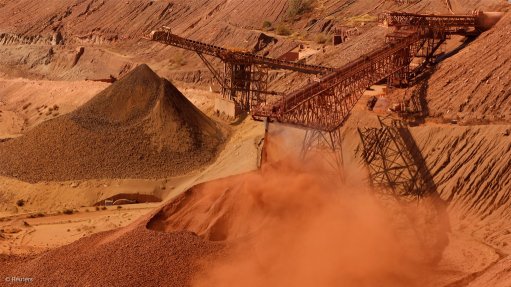
Photo by: Reuters
PERTH (miningweekly.com) – A new study has revealed that plans to increase taxes on Western Australian iron-ore by another A$7.2-billion will make the nation the world’s highest taxing iron-ore jurisdiction, with an effective tax rate on iron-ore three times larger than its main competitor, Brazil.
In releasing the data on Monday, the Minerals Council of Australia (MCA) and the Chamber of Mines and Energy of Western Australia (CME) said in a joint statement that the study debunked claims by new Western Australian National Party leader Brendon Grylls that the iron-ore sector was lightly taxed.
In fact, the study pointed out that Australia, at a tax rate of 37%, had the third highest marginal effective tax and royalty rate of nine countries examined, outstripping Colombia and Brazil, with only Zambia and South Africa having higher fiscal burdens. The tax will increase the marginal effective tax rate on iron-ore to 45% – the highest in the world.
“The Grylls tax will represent a gold-plated gift to Australia’s iron-ore competitors, most notably Brazil,” said MCA CEO Brendan Pearson.
“With iron-ore accounting for 16% of Australia’s export income, this tax would represent a massive self-inflicted wound on both the national and Western Australian economies.”
CME CEO Reg Howard-Smith added that the proposed tax would also be harmful to Western Australian regional communities.
“Western Australia would officially become the least attractive destination for investment in the world. It would undo, in one fell swoop, the efforts of successive Western Australian governments of both political persuasions to develop the great iron-ore province of the Pilbara,” he said.
The report concluded that overall, Australia’s business tax structure lacked competitiveness due to its relatively high company income tax rate and stamp duties, and recommended that the company income tax rate be reduced to at least 25%, if not closer to 20%.
Grylls in August announced plans to introduce a A$5/t mining tax on iron-ore big wigs BHP Billiton and Rio Tinto, which could raise A$7.2-billion in taxes over a four-year period, and return the state budget to surplus. The tax will not be applicable to any other iron-ore producer, including major Fortescue Metals.
The National Party – the smaller party in the ruling coalition in the state – believes that Western Australia and taxpayers have facilitated the expansion of the iron-ore industry at “great cost”, and charge that big miners have not paid their fair share.
However, the MCA pointed out last week that in 2014/15, Rio Tinto and BHP Billiton had contributed A$3.2-billion in royalties to the government and a further A$259-billion in other state government taxes. Iron-ore royalties to the state government have doubled since 2009/10, from A$1.5-billion to an estimated A$3.6-billion in 2015/16.
The two mining companies have bought about A$80-billion worth of goods and services from local businesses in the five years to 2015/16, while infrastructure investments for towns and communities amounted to A$2.7-billion.